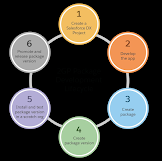Understanding Salesforce (SFDX) for Modern Development |SalesForce DevOps
Introduction: Salesforce DX, often abbreviated as SFDX, is a powerful set of tools and features provided by Salesforce for modern software development on the Salesforce platform. This suite of tools is designed to enhance the development, testing, and deployment processes, enabling developers to build robust and scalable applications efficiently. - Salesforce DevOps Online Training Institute
Subheading 1: Evolution of Salesforce Development Salesforce DX emerged in response to the evolving needs of Salesforce developers and the growing complexity of building applications on the Salesforce platform. Traditional development approaches had limitations in terms of collaboration, version control, and continuous integration. SFDX addresses these challenges by introducing a more modern and streamlined development workflow.
Subheading
2: Key Components of Salesforce DX
CLI (Command Line Interface): The Salesforce CLI is a
fundamental component of SFDX. It provides a command-line interface that allows
developers to interact with Salesforce orgs, manage source code, and execute
various development tasks. The CLI facilitates scripting, automation, and
integration with other development tools.
Scratch Orgs: Scratch Orgs are disposable and configurable
Salesforce environments that can be created and destroyed on-demand. They
enable developers to work in isolated environments, closely mirroring
production settings. This promotes collaboration, parallel development, and the
ability to test changes in a controlled environment. - Salesforce
DevOps Training in Hyderabad
Source-Driven
Development: SFDX
promotes a source-driven development model, where the source of truth for a
Salesforce application is the version-controlled code. This allows developers
to manage their codebase using industry-standard version control systems like
Git, facilitating collaboration and code reviews.
Subheading 3: DevOps and Continuous Integration with SFDX
Salesforce DX integrates seamlessly with DevOps practices and continuous
integration pipelines. Developers can automate the testing and deployment of
their applications using tools like Jenkins, Travis CI, or CircleCI. This
ensures that changes are thoroughly tested and can be deployed with confidence,
reducing the risk of errors in production.
Subheading
4: Packaging and Distribution SFDX
introduces the concept of unlocked packages, a modular and customizable
packaging system. Unlocked packages make it easier to organize and distribute
Salesforce applications, providing a flexible way to manage dependencies and
promote modular development practices. This is particularly valuable for large
development teams working on complex projects. - Salesforce
DevOps Online Training
Subheading
5: Collaboration and Team Development
Salesforce DX encourages collaboration among developers by facilitating the use
of version control systems, collaborative development tools, and modular
development practices. With the ability to spin up Scratch Orgs for different
tasks, developers can work in parallel on various features without interfering
with each other.
Conclusion: Salesforce DX represents a
significant step forward in the world of Salesforce development. By embracing
modern development practices, automation, and collaboration, SFDX empowers
developers to create high-quality applications more efficiently. As
organizations continue to leverage the Salesforce platform for their business
needs, understanding and adopting Salesforce DX becomes essential for staying
competitive in the ever-evolving landscape of enterprise software development.
Salesforce DevOps
Online Training Institute - Visualpath provides best Salesforce DevOps Online
Training by real-time faculty with real time Projects. We are Providing
Salesforce DevOps Online Courses USA, UK, Canada, Dubai, Australia. Call on
+91-9989971070.
WhatsApps: https://www.whatsapp.com/catalog/919989971070
Visit : https://visualpath.in/salesforce-devops-online-training.html




Comments
Post a Comment